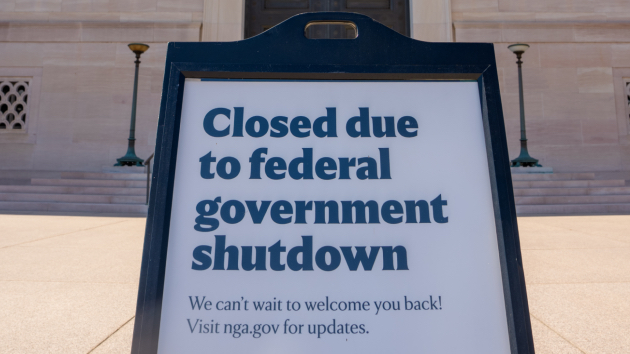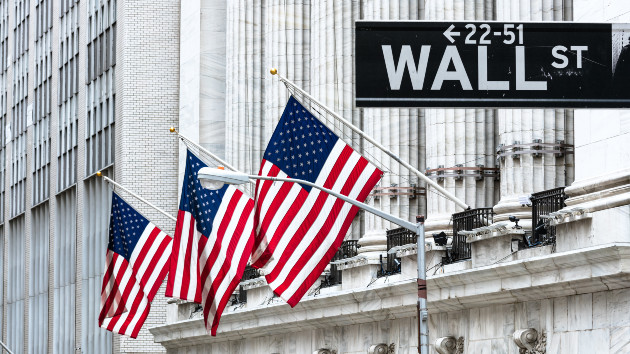Fed leaves interest rates unchanged amid optimism US can avert recession
Written by ABC Audio ALL RIGHTS RESERVED on September 20, 2023

(WASHINGTON) — The Federal Reserve left its benchmark interest rate unchanged on Wednesday, pausing an aggressive inflation fight amid growing optimism that the United States can achieve normal price levels without falling into a recession.
The central bank expects to raise rates one more time this year, according to projections included alongside a statement on Wednesday from the Federal Open Market Committee, or FOMC, the Fed’s decision-making body on interest rates. Interest rates will begin to come down next year, the projections said.
The projections also reflected a sunnier outlook for U.S. economic performance, setting expectations for economic growth next year at 2.1%. In June, the FOMC had predicted that the economy would grow just 1% in 2024.
Meanwhile, inflation stands well below its peak last year of over 9%, but remains more than a percentage point higher than the Federal Reserve’s target rate.
“Given how far we have come, we’re in a position to proceed carefully as we assess the incoming data and the evolving outlook and risks,” Fed Chair Jerome Powell said at a press conference in Washington D.C. on Wednesday.
Even so, the Fed remains far from achieving its target inflation rate of 2%, Powell added. “The process of getting inflation sustainably down to 2% has a long way to go,” Powell said.
The decision to hold interest rates steady affords policymakers time to weigh their next move as a rapid series of previous rate hikes takes full effect.
“The Fed wants to get more information to calibrate when exactly they want to stop raising rates,” William English, a professor of finance at Yale University and a former Fed official, told ABC News. “There’s a lot of uncertainty.”
The Fed achieved the cooldown with its most aggressive set of rate hikes in more than two decades, making borrowing costs more expensive for everything from homes to boats in an effort to choke off demand and ease price hikes.
Still, resilient economic performance has elicited a surge of optimism about the possibility that the U.S. can reduce inflation without falling into a recession.
“Economic activity has been stronger than we expected — stronger than just about anybody expected,” Powell said on Wednesday.
In July, Powell said the central bank’s staff had abandoned its forecast of a downturn. Staff at the Fed, in other words, now expect the central bank to achieve a “soft landing.”
In recent months, however, that glide path has run into turbulence.
Inflation has ticked up for two consecutive months, reversing some of the progress made in the effort to bring price increases down to normal levels. Meanwhile, oil prices have soared, threatening to push inflation even higher.
On top of that, a strike launched by thousands of autoworkers on Friday risks choking off the supply of cars and elevating prices, further endangering the inflation fight, economists previously told ABC News.
Economists surveyed by Bloomberg expected the Fed to leave its benchmark interest rate unchanged.
While the economy has slowed in recent months, it has appeared to resist the type of dramatic cooldown that would risk a recession.
Hiring held steady in August with the U.S. economy adding 187,000 jobs, despite a sharp downward revision of job growth estimates in June and July lowered those totals by a combined 110,000 jobs, Bureau of Labor Statistics data showed.
The unemployment rate inched up to 3.8% in August but remains near a 50-year low, the data showed.
A major upward revision of government data showed that gross domestic product increased at a 2% annualized rate for a three-month period ending in March — a sizable jump from the previous estimate of 1.3%.
Still, U.S. economic growth over the first three months of this year was slower than the 2.6% growth in the previous quarter. In turn, that performance was down from 3.2% growth in the quarter before that.
An economy demonstrating more strength than expected bodes well for workers seeking to extract higher wages from employers to offset losses incurred by the recent bout of inflation, Andrew Levin, an economics professor at Dartmouth College and a former Fed economist, told ABC News.
But the demand for pay increases could put pressure on companies that may feel the need to charge higher prices as a means of addressing ballooning labor costs. In turn, that dynamic could keep inflation stubbornly high and undercut the positive outlook at the Fed, Levin added.
“The problem here is that if the Fed is too optimistic about a soft landing and the plane doesn’t land, they’re going to have to change course and that could be painful,” Levin said. “These are difficult decisions for the Fed.”
Copyright © 2023, ABC Audio. All rights reserved.

 KVSP
KVSP 




